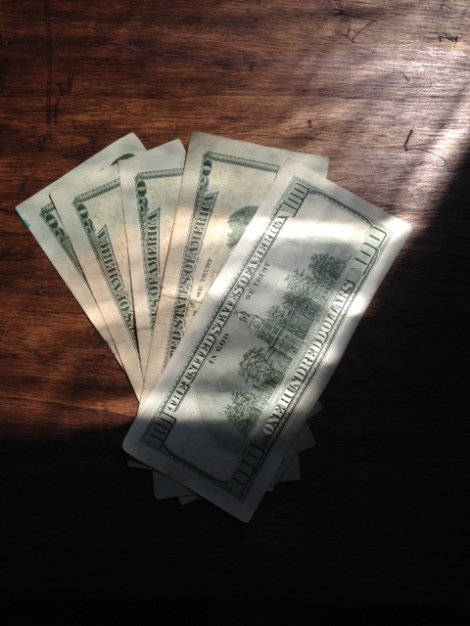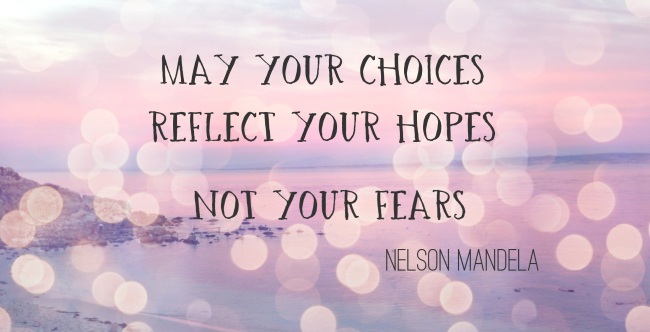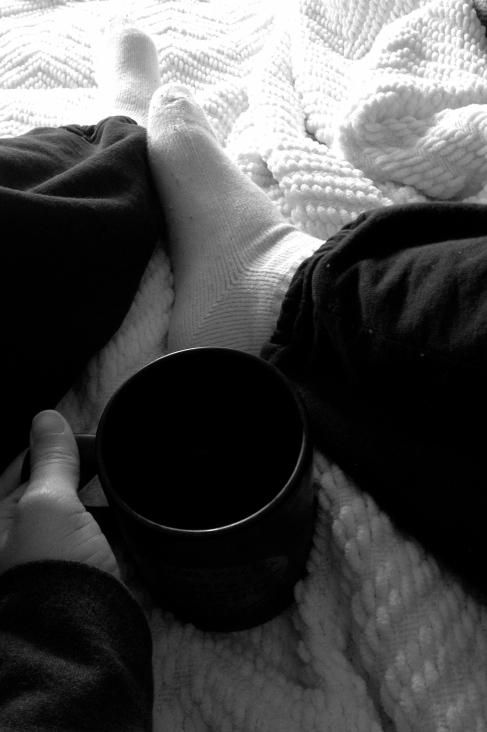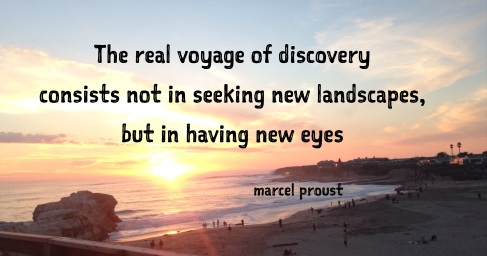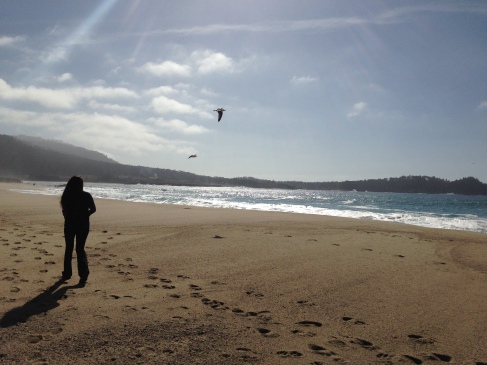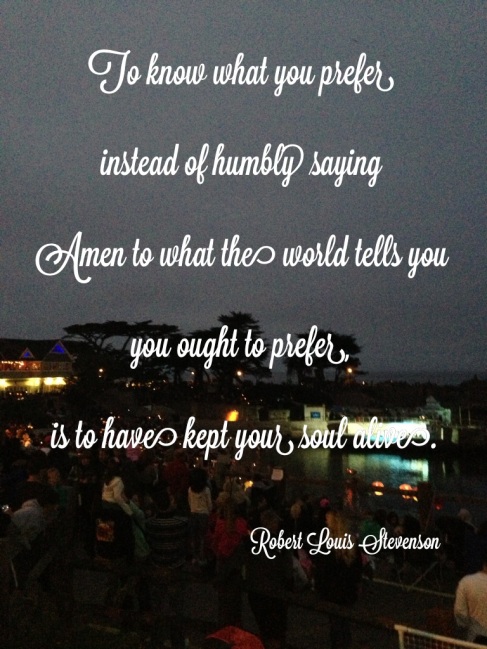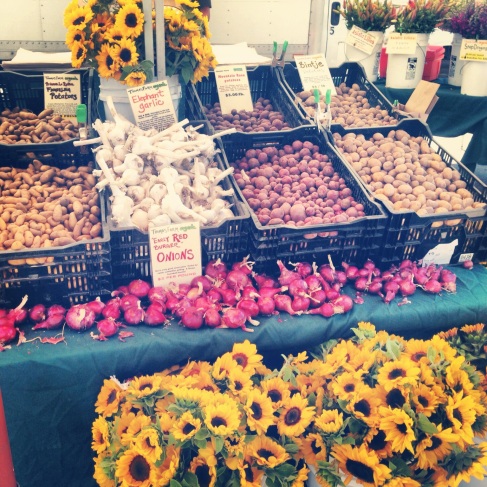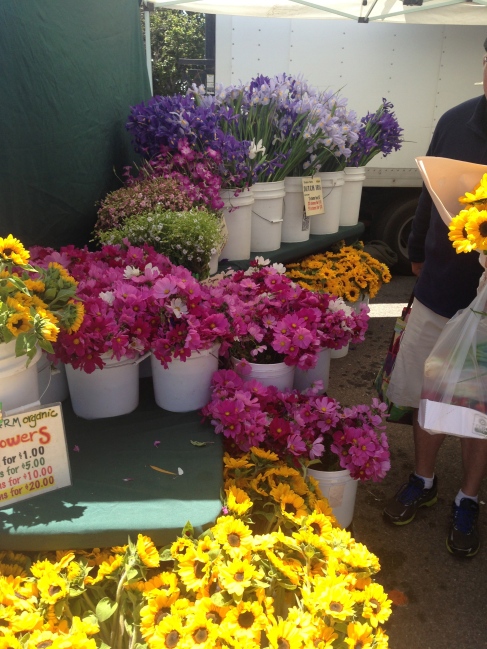Tag Archives: happiness
Is Wealth A Burden?
I read an interesting article in Vanity Fair magazine the other day about Perfection Anxiety, and it discussed how extreme wealth may actually be a burden. The article proposes that when money is limitless, it ceases to make one happy. We’ve all fantasized about winning the lottery, (I know I have) and becoming rich beyond our wildest imaginations. Rich enough to quit our 9 to 5ers, rich enough to buy that expensive sports car or take your friends to a fancy dinner….every night. What if this fantasy was just that, and if extreme wealth was really a burden?
Statistics show that money does make you happier, but only up to about $50,000/year. After that, the more money you have, the less it matters. Think of it this way, if you gave a starving man a cheeseburger, that one cheeseburger would make him really happy. If you gave a starving man 2 cheeseburgers, the second probably wouldn’t make him as happy as the first, but it may make him a little bit happier in comparison to how happy he felt after the first one. If you gave a starving man 8 cheeseburgers, he would not feel 8 times happier than he did after the first one. It’s the same with money. Money can give you the things that you need and want, and this will make you happier, however only to a certain extent.
The Vanity Fair article explains that when one has too much money, it “stops working” to make you happier. I wrote a post about happiness and how we don’t just want to experience happiness, but we also want to achieve it. In fact, in order to feel truly happy, we must also experience sadness in contrast. Think of how happy and excited you feel when you buy something you’ve been lusting after for a while, something you’ve saved up for. Think of how grateful we feel when a loved one buys us a present we’ve really wanted for a long time; that high you get when you get that new iPhone or super nice yoga mat. Now, imagine you could buy anything you wanted, always and forever, and suddenly that excitement, anticipation, gratitude is lost. It’s important to have goals, things we can’t yet attain, because we feel a sense of pleasure in working towards these goals and then a sense of accomplishment when we reach a goal.
If you are among the extremely wealthy, I’m sorry. Let me know if I’ve gotten it wrong. If you are not among the extremely wealthy, you get to take this moment to be grateful that you can still derive pleasure from things. We get to feel grateful that we have things to work for, presents to give, and get, and we can still derive simple pleasure from saving up for a special treat. And remember, winning the lottery probably won’t solve your problems, so enjoy the moment : ) Happy Weekend!
Happy Weekend!
The “why” is such an important question to ask yourself. “Why” is much more important than the “what”. If you have the “why” right, then the “what” will fall into place. Whenever you are struggling with a choice or a decision, ask yourself why. If the choice would be made because of fear, insecurity, ego, pride, or anger, then this is probably not the right decision. If the why is based on love, hope, integrity, determination, then the choice is probably the right one. When we make a choice out of fear, we give fear power over us and our lives. I believe that fear is never a good reason to make a choice, and thus when I realize that fear is dictating my anxiety, or driving my decision, I am able to step back and re-evaluate. What do you want to fill your life with? Make decisions based upon the intentions for your life. Be motivated by these positive intentions, and the “what” that results from this motivation, will most likely be positive as well. Happy weekend : )
Happy Weekend!
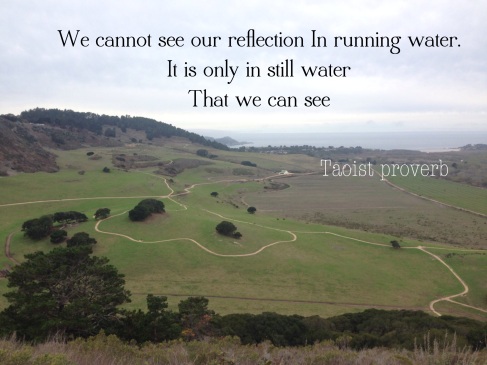 This quote is quite fitting for the weekend, as the weekend is a time when most of us can get still again. This past week was particularly busy for me, and waking up this morning to stillness and and open day has made all the difference. When I am too busy, my mind can’t open. I have to get still, to find peace and clarity. If you are feeling overwhelmed, try creating stillness, either by taking a day off, or going to a remote place to be alone. Hope you are able to see this weekend by creating space : ) Happy Weekend!
This quote is quite fitting for the weekend, as the weekend is a time when most of us can get still again. This past week was particularly busy for me, and waking up this morning to stillness and and open day has made all the difference. When I am too busy, my mind can’t open. I have to get still, to find peace and clarity. If you are feeling overwhelmed, try creating stillness, either by taking a day off, or going to a remote place to be alone. Hope you are able to see this weekend by creating space : ) Happy Weekend!
Simple Pleasure-Doing Nothing
Sunday was a rainy day, a lazy day. Matt and I spent the entire day inside, reading, browsing the internet, and watching our favorite movie “Garden State” for the millionth time. We had to resist the urge to go out and “do something”. I’ve noticed that if I don’t do something each day, I feel a bit worthless and unproductive (even on my weekend days). In “Eat Pray Love” Elizabeth Gilbert wrote about the Italian attitude towards a lazy day.
“Il bel far niente means ‘the beauty of doing nothing’… [it] has always been a cherished Italian ideal. The beauty of doing nothing is the goal of all your work, the final accomplishment for which you are most highly congratulated. The more exquisitely and delightfully you can do nothing, the higher your life’s achievement. You don’t necessarily need to be rich in order to experience this, either.”
-Elizabeth Gilbert quoted from the book “Eat Pray Love”
I’ve also been re-reading “The Geography of Bliss”, as it’s been a few years since I read the book for the first time. Eric Weiner writes about this “beauty of doing nothing” as a concept in happiness studies. He highlights this idea most beautifully through the concept of the café. Cafés, Weiner explains, are a place where Europeans can spend an entire day, people watching and socializing without an ounce of guilt. The most delicious part of this pastime is that it costs very little money, if any, but can provide you with a tremendous amount of joy, peace, relaxation, and reconnection.
I don’t think I’m the only one who feels guilty spending an entire day doing nothing. So why is that? What is it about our culture that has made us feel as though we have to do “something” everyday? Why do we feel guilty spending an entire day in our pajamas, reading, drinking tea, and laying around? And, if you say “but I am too busy to take a day off” should this be so? Our culture has glorified the concept of busy, and I know I have days where I’m rushing constantly from one thing to the next. It doesn’t feel good to be too busy, to have obligations, a planned and packed schedule. In fact, when I get too busy, I begin to feel as though I’m not in control of my life. I miss the option of spontaneity. There is something freeing about having the option to do whatever you feel like doing, in that moment, for an entire day. This is such a simple pleasure; one that anybody can enjoy regardless of economic status. I’ve written about the importance of creating space in order to feel mindful, connected, or creative, in the past and the concept of doing nothing is connected to the concept of creating space. How would people’s lives change if everyone in our country took one day off a week to enjoy the beauty of doing nothing? Try this sometime and allow yourself to really enjoy the day.
Happy Weekend!
Don’t get me wrong, traveling is great and wonderful, because often, it opens you up and gives you new perspectives. However, there are also many ways to gain new insight. For instance, I have read books that have changed me. I have read books that, afterwards, I was a different person because those books gave me new eyes. Yoga, also, has lead me to discovery and to gain new insights on life. This is what we should seek. We need to seek experiences that help us to grow and transform…to see the world with new eyes. We need to seek experiences that give us fresh perspectives. Perhaps seeking new landscapes gives one new eyes, and perhaps it doesn’t. Depends on the landscape. Depends on the person. Depends on the particular experience. The point is to seek experiences that give you new eyes. Happy Weekend!
Simple Pleasure-Having A Bad Day
“What?” you might ask “how is having a bad day pleasurable?”
Just hear me out. This week I had a bad day. It wasn’t the kind of bad day where you spill coffee on yourself or get stuck in traffic. It was the kind of bad day where everything feels hopeless, you doubt whether or not you are on the right path in life, and whether you will ever obtain your goals. It’s the kind of bad day where all of your fears, doubts, and stressors for the past month culminate and simultaneously express their presence. It’s been depressingly foggy here for the past month, which probably hasn’t helped my mood and I had to go pay my tuition for the fall semester of graduate school, which is always stressful.
Matt and I went to the beach. Our favorite beach and I told him how I was feeling: everything that I was afraid of at the moment, and everything that had stressed me out over the past week or so. I almost cried but didn’t (this wasn’t quite that kind of bad day) but I still felt a release and Matt pointed out that I was so far into the future, worrying about things that haven’t happened yet. He said “you’re just like me Hun” and I said “I’m just like everyone” and in that moment I remembered that this doubt and this fear, if nothing else, is what connects every human to one another. Of course, some suffer more than others, and about different things, but everyone, at some point, and probably often, suffers and fears, and doubts. In the social work program people speak of “the worried well” as a snide way to dig at the wealthy who seek therapy or at the therapists who treat the wealthy. It’s a term that denotes the idea that those with monetary wealth don’t have “real” problems, or don’t suffer. I would argue the contrary. I believe that we all suffer and must suffer. If we don’t have money to worry about, our mind will find other insecurities to focus on.
In “The Geography of Bliss” Weiner has this poignant moment where he’s smoking marijuana at a café in the Netherlands and wondering if being high is the reason the people there are so happy. He poses a question to the reader asking something like “if you could have a procedure done to your brain that caused you to feel pleasure always, and there were no possibilites of complications, would you do it?”. Think about this question for a second. Would you have the procedure to feel pleasure every second of every day? If the answer is no, then Weiner explains that you believe happiness must be earned; that in order to truly feel happy, one must not only earn this happiness, but also, at times, experience unhappiness. Everything experienced is relative. Following this philosophy, without unhappiness, one cannot have happiness. Without bad days, one cannot have good days, or even great days.
Without a really shitty yoga class, one cannot understand the elation felt after truly being in the zone, going through the asanas with a clear mind and relaxed body. Without a good, hard cry now and again can we have a truly good hard laugh? Rumi said that even grief and sorrow was a cause for rapture, I believe, because these extreme forms of emotion are also extreme forms of expression; a sign that we are truly and vividly alive.
So, I had a shitty day. I felt hopeless. I felt doubt. I felt fear and despair and sadness. But it also pushed me to realize that I was too far into the future. It forced me to stop and refocus my energy on the present. It caused me to make a mental list in my head about all of the things I was grateful for, and I realized that according to my values I really did have a lot. I am rich with love and I feel like I know who I am. I know where I want to go in life but am also open to the possibility that life could take me in a different direction. So, in the end the bad day changed me for the better, if not in the long run, at least in that moment. It made way for me to have a good day, and reminded me that perspective has the power to define a moment. I was able to change mine, and so my simple pleasure for the week was that bad day.
Happy Weekend!
We are constantly bombarded with messages regarding what we should want or should prefer, or should be happy with. None of this is necessarily true. Everyone is different and there are many roads to take, many modes of transportation to happiness, meaning, authenticity, success, and love. Question everything and maintain constant communication with your emotions and your body as these are often the first to react if something doesn’t feel right. Happy Weekend!
Simple Pleasure-Farmers Markets
The farmer’s market is something that I look forward to every week. It has not only become a simple pleasure, but also a necessity for me; something that I rely on for procuring my weekly fruits, veggies, herbs and flowers. When you are gluten free and vegetarian, vegetables are a necessity! Reading “In Defense of Food” by Michael Pollan was the catalyst that began my diet transformation. In this book, he argues that how we eat determines, not only our health, but also how we want the world to be. The typical American eats at least 3 times/day and is therefore spending money on food at least 3 times per day, per person, on average. How we buy our food matters and the fact that we spend money on food daily gives us an enormous amount of power in determining how we want our food produced. The increase of gluten free options and organic selections are evidence that consumers have power to change the system and selection of food available. Michael Pollan explains that every dollar we spend as consumers counts a a vote for how we want the world to be. The more we spend money on organic produce, the more the industry will put into producing food organically. Simple supply and demand. The more we support local, organic farmers, the more likely these farmers are to stay in business. What we spend our money on matters!
Michael Pollan also argues that transparency is crucial in transforming the food industry. In a standard supermarket, the farmer is left out of the interaction, and thus transparency is impossible. Accountability is also much less likely to be present in the interaction between you and the corporate grocery store. However, when you take the middle man out and have a real face-to-face interaction with the farmer who grew the produce you’re buying, you can ask questions like “do you use pesticides on your produce” “how do I cook this squash”, “how do I know when a peach is ripe” “what is this odd looking edible plant” (because you will surely see produce at a farmer’s market that you’ve never seen in a grocery store before. You are able to give your money directly to the person/farm that grew your produce and they are able to put a face to their customers, increasing the farmer’s sense of accountability. At a farmers market, suddenly, food gets personal. It becomes an aesthetic, sensory, personal experience. You are able to smell the produce, speak to, and ask questions of the farmers, listen to the local blue grass band that plays live during the market, and give your money to the person who actually grows your produce. It’s romantic, idealistic, and reconnects you with the process of buying food for you and your family. This process is something that our culture has become disconnected with.
Matt and I have built relationships with some of the farmers. We have our favorite stands/farms and often, vendors will remember if we’ve missed the week before. We have learned how to cook new produce like acorn squash and how to tell if a peach is ripe thanks to the farmers sharing their knowledge with us. Also, it’s just a great place to get kick-ass deals! We can buy organic produce for half of what it would cost us at Whole Foods and have a good time while doing it. The produce is local, and therefore seasonal, picked when at its peak, and very high-quality. I couldn’t imagine buying my flowers anywhere else, and I feel good knowing that I am spending my money supporting a philosophy that I believe in! Often the markets will include ready-made food stands from local restaurants, or coffee. I love to get a bag of kettle corn for dessert or a cup of coffee at the morning markets.
Life is a process, so you may as well enjoy every part you can. My simple pleasure for the week is the farmers market because it allows me to get great deals, make my dollar stand for something that I believe in, and enjoy the process of buying fruit, herbs, veggies and flowers for the week.
Happy Weekend!
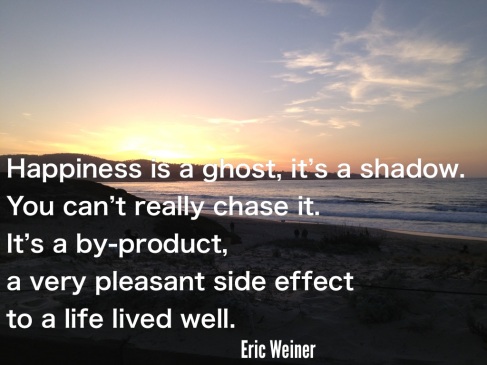 This is a quote from the book “The Geography of Bliss” by Eric Weiner which is an amazing book (I’ve actually been thinking of reading it a 2nd time)! I believe that certain things are by-products of larger issues. When I was trained in motivational interviewing I learned that resistance from a client is a by-product of the relationship between you and that client, therefore you must change the relationship in some way (e.g. the way you relate to your client) if you want to diminish their resistance. I’ve heard that weight, and the way that we eat, is also a by-product. In Geneen Roth’s book “Women Food and God” I believe she stated something like ” the way you relate to food is the way that you relate to life”. She found that her “weight issue” wasn’t really about weight, but rather the way that she related to life. Her weight was simply a symptom to something greater. I believe that happiness is also one of these by-products, something that we can’t focus on specifically, but that is simply a symptom of something greater. I believe that if we live our lives well, happiness will come naturally and that if we aren’t happy, we must look at what might be in our lives that is bringing us down instead of up. I also recognize that our culture places such an emphasis on happiness. We take pills, accumulate material goods, take vacations, go to therapy, all in the pursuit of happiness, and yet I do believe that Eric Weiner had it right when he said that happiness was a ghost, a shadow, that you can’t really chase it. You must live your life well, fill it with love, gratitude, passion, honesty, and meaning, and then, perhaps happiness will be a lovely side-effect of your life well-lived.
This is a quote from the book “The Geography of Bliss” by Eric Weiner which is an amazing book (I’ve actually been thinking of reading it a 2nd time)! I believe that certain things are by-products of larger issues. When I was trained in motivational interviewing I learned that resistance from a client is a by-product of the relationship between you and that client, therefore you must change the relationship in some way (e.g. the way you relate to your client) if you want to diminish their resistance. I’ve heard that weight, and the way that we eat, is also a by-product. In Geneen Roth’s book “Women Food and God” I believe she stated something like ” the way you relate to food is the way that you relate to life”. She found that her “weight issue” wasn’t really about weight, but rather the way that she related to life. Her weight was simply a symptom to something greater. I believe that happiness is also one of these by-products, something that we can’t focus on specifically, but that is simply a symptom of something greater. I believe that if we live our lives well, happiness will come naturally and that if we aren’t happy, we must look at what might be in our lives that is bringing us down instead of up. I also recognize that our culture places such an emphasis on happiness. We take pills, accumulate material goods, take vacations, go to therapy, all in the pursuit of happiness, and yet I do believe that Eric Weiner had it right when he said that happiness was a ghost, a shadow, that you can’t really chase it. You must live your life well, fill it with love, gratitude, passion, honesty, and meaning, and then, perhaps happiness will be a lovely side-effect of your life well-lived.


